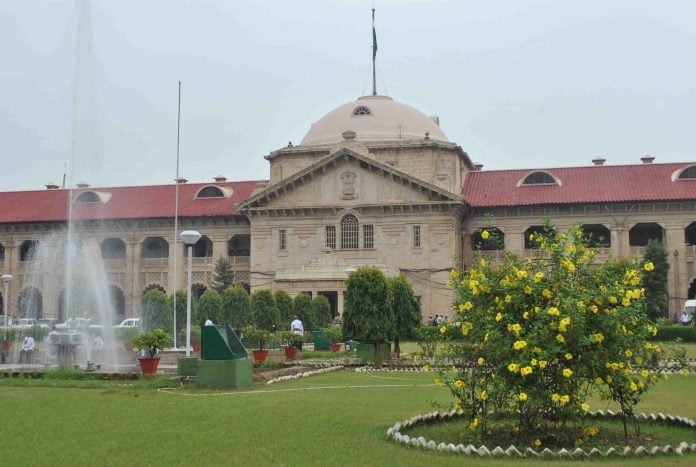The High Court of Judicature at Allahabad on Friday allowed the Special appeal referring to the provisions of Juvenile Justice Act 2000, and set aside the order passed by Single Judge on suppression of an information despite specific question as to whether the person had been convicted by any court of law.
The case of the appellant is that the U.P. Police Recruitment and Promotion Board, Lucknow notified an appointment of police Constable and Constable in PAC (Male) Direct Recruitment, 2015 and the appellant got selected on the basis of his academic qualifications and also was declared qualified in the physical test. Later on, he was allotted a district in U.P named as “Deoria” for training. Wherein, he was required to file a declaration affidavit being a notarial affidavit / verification form which he filed as per the instructions. Afterwards, the order was passed by the District Nodal Officer, Azamgarh in which the candidature of the Appellant was cancelled on the ground of material concealment of pendency of a criminal case against him which was notdisclosed in the affidavit / verification form by him. As per the criminal record a FIR was lodged against the appellant under sections 147, 323, 308, 325, 504, 506 I.P.C., P.S. Kundrapur, District Azamgarh. The appellant then was declared as a juvenile and his case was taken up by the Juvenile Justice Board, Azamgarh. He thereafter was kept under probation for a period of one year and then was released. The appellant was thus aged about 16 years at the time when the F.I.R was lodged.
The Single Judge through his order dismissed the writ petition filed by the appellant in the aforesaid case on the ground that the petitioner therein cannot be given benefit for suppression of an information despite specific question in the affidavit along with the application form / verification form as to whether he had been convicted by any court of law. The said information as supplied by the petitioner was found to be incorrect by the authorities and as such the authorities concerned were well within their authority to cancel the candidature of the petitioner.
The case was heard by the division bench comprising of Chief Justice Govind Mathur and Justice Samit Gopal and the bench referred to the provisions of the Juvenile Justice Act, 2000; it further incorporated section 19 of the Act in order to give a juvenile an opportunity to lead his life with no stigma and to wipe out the circumstances of his past. It thus provides that a juvenile shall not suffer any disqualification attaching to conviction of an offence under such Act and Section 19 (1) of the Act of 2000 which stipulates that juvenile shall not suffer any disqualification attached to the conviction of an offence under such law. Further Section 19 (2) of the Act of 2000 contemplates that the Board must pass an order directing all the relevant records of such conviction to be removed after expiry of the period of appeal or reasons as prescribed under the rules as the case may be.
“The concealment of the pendency of criminal case against the appellant-petitioner was of no consequence. As per the requirement of law a conviction in an offence will not be treated as a disqualification for a juvenile. The records of the case pertaining to his involvement in a criminal matter are to be obliterated after a specified period of time. The intention of the legislature is clear that in so far as juveniles are concerned their criminal records is not to stand in their way in their lives. The cancellation of the candidature of the appellant-petitioner was thus bad. The authority concerned failed to appreciate the fact that the appellant-petitioner was entitled to benefit of the provisions of Act of 2000”held by the court.
The court observed that the Act of 2000 does not envisage incarceration of a juvenile which clearly shows that the intention and object was not to shut the doors of a disciplined and decent civilised life. It provides him an opportunity to mend his life for the future.
The court while allowing the appeal directed the Recruitment Authority to reinstate the Appellant with all consequential benefits.
-India Legal Bureau


